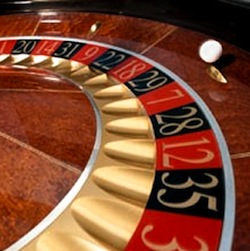Warning: This post is me at my most disreputable. Not only do I report on actively trading bank preference shares as frantically as a ping pong champion paddling towards a Pyrrhic Victory, but the trades weren’t great, either! Trackers are a better bet for most.
One of my least glorious capital allocation decisions of the past couple of years was a belated foray into preference shares.
Various bank preference shares have been intermittently hammered by the banking whirl-y-gig of the past four years. Some private investors made fortunes in 2009 through the time-honoured method of buying low and selling high. I bought middling and sold middling, and in doing so missed the opportunity to put that money into something more profitable.
In May 2010 I bought into the Natwest preference shares with the NWBD for a running yield of around 9% and a troubled parent in the form of RBS. A little later in July 2010 I bought the Lloyds 9.25% issue with the ticker LLPC, sold out later that year before they fell out of sheer luck (I wanted the money to invest in something else), bought again in February 2011, then sold a bit more ‘skillfully’ (quotes to admit I might also have been lucky again) before they got truly bashed by this summer’s Banking Crisis Mark 2.
I sold my last batch of LLPC for 86p back in June, and while that’s much more than you’d get for them now it’s also less than the 92p I paid for a few thousand of them in February! I did better with the earlier batch that I reported on here on Monevator, but overall I lost money on these. There was no dividend from LLPC, of course, as the coupon is suspended.
I sold a little over half the NWBD for a penny down, then the rest in April 2011 – for a few pence more than I paid for them, and with a bit of income in the bag – after I got frightened off by RBS revealing that Natwest made a loss in 2010, thanks to the dreadful Ulster Bank. RBS stepped up and injected more money into its Natwest subsidiary, which might seem positive. However my comfort blanket had been that Natwest was somewhat insulated from the wider turmoil at RBS, so being bailed out by that basket case wasn’t exactly reassuring.
Overall I made a tiny amount of money on NWBD, thanks partly to the big dividend, but lost more on LLPC. And my broker probably had a pretty good steak dinner on my shenanigans.
Preference shares cheap again
The good news from my perspective is that if I’d held on to either preference share I’d be much further underwater. Bank preference shares have fallen with bank shares on summer’s worries – to the extent that they’re tempting me back for a second look.
This may surprise you, given the largely success-free first jaunt I’ve just recounted. But my motto in investing is never say never again. (Besides, I’ve done far worse from some stock picks – 100% worse in fact!)
Today LLPC is trading at 68p mid-price 1. NWBD has a mid-price of 87.5p, which is 14p cheaper than when I first wrote about it last year. In both cases there is a hefty spread of about 4p. You may do well to use a limit order to try to knock a penny off the price you pay.
Turning to the yield spreadsheet at the enthusiast-run Fixed Income Investments website, you can see that the Natwest issue NWBD is now yielding over 10% on the mid-price – quite a bargain, on the face of it.
There’s no yield given for LLPC because the coupon is still suspended until 2012. With a coupon of 9.25%, an overly-simplified calculation of the yield indicates that at 68p a fully-functioning LLPC share would be yielding over 13%!
I won’t go through all the particulars of the two issues again, so please see my original articles on LLPC and on NWBD for the detail (some of which will now be outdated, given developments since then).
Risks, risks, everywhere
In a world where benchmark government bonds are yielding less than 2%, you don’t need Jim Cramer screaming to tell you something is up when NWBD is offering a yield of over 10% in perpetuity, and LLPC the prospect of a 13% yield.
In my view the reasons are a combination of:
- The Irish exposure that hit both RBS and Lloyds around Christmas 2010. Previously, these banks had been seen to be already moving into profit, but they were forced to take huge writedowns by their duff Irish loans.
- The more recent resumption of the Greek crisis. Disorderly disintegration of the Eurozone is now perceived to be a real possibility, and in that case banks would be hammered. Lloyds for one has very little Greek exposure, but it is exposed to other PIIGS. And then there’s the issue of contagion. In this post-Lehman’s era, everyone fears counterparty risk.
- The wider despondent stock market of the past few months that has sent various European indices down 20% or more. Preference share holders have been reminded that despite their fixed coupons, these securities behave much more like equities than bonds – as they should, because their coupons are not as secure as with bonds, and they come straight after equities in the firing line in the event of a bankruptcy.
- There are fears that both RBS and Lloyds may need to raise more capital – even independent of a European implosion – due to further government bank regulation. Some fear such capital raising could impact the rights of existing preference share holders, or in the case of LLPC that it could delay resumption of the dividend.
- I’d add that Irish meddling with the usual rights of bond holders hasn’t improved the backdrop for investing in these exotic instruments. On the contrary, shareholders now believe they need to be more vigilant.
- Finally, remember these securities are very illiquid – you can easily move the price of LLPD, the smaller Lloyds preference share issue, with a relatively trivial purchase or sale.
No preference for preference shares… yet
Are all these fears and risks adequately reflected in the price of bank preference shares today?
That’s the £64,000 question, and I don’t have a firm answer.
When I was originally interested in bank preference shares, it was because I believed the banks’ worst problems were behind them. That proved highly optimistic.
Having said that, Europe-aside the banks do seem to be getting their books in order. For instance Lloyds (which I still own ordinary shares in, and have traded heavily for a similarly turbulent ride) has been paying back tens of billions of pounds worth of special government support. And for what it’s worth analysts are still forecasting a modest return to profit for both it and RBS for 2011.
On balance, with the FTSE 100 down around 5,200 and plenty of ordinary shares I like looking good value, I’m not currently buying these bank preference shares against the backdrop of increased uncertainty.
If Europe was to resolve its problems quickly (I for one expect them to be solved eventually) and/or the wider market was to rally strongly without carrying up the bank prefs with it, then I might change that stance and have a nibble.
For what it’s worth (read my disclaimer!) my gut feeling is NWBD will continue to pay its coupon, and that one day its share price will be a lot higher. I’m not quite so confident as I was in summer last year, however, given how hard Natwest was hit by Ireland’s woes in 2010, though one would hope this has now been sufficiently discounted by the big writedowns the UK banks have taken on those Irish loans.
The situation with LLPC is more intriguing. When I first wrote about them they were two years away from a potential resumption in paying their dividend (due to the expiry of the EU’s block on the payment). Now they’re only eight months away. In other words, we could be getting to the point where we don’t have to factor in missed coupon payments when calculating the effective yield on the purchase of LLPC.
Of course there’s no guarantee that LLPC will resume payments in May – Lloyds may not make a profit, it may decide it’s not politically expedient to pay shareholders cash while still being seen as ‘saved by the taxpayer’, or it may try to ride roughshod over shareholder rights.
But Lloyds has reaffirmed its commitment to dividends, and it’s theoretically on track to make a profit. And according to the rules governing its preference shares it can’t pay ordinary shares a dividend until the preference shares are paying again, which is the number one bull case for owning them.
This resumption of payments was at least as uncertain when I wrote about them in early 2010. Yet given that the shares are 15p cheaper and the first resumed payment is potentially much closer, then all things being equal they are more of a bargain than they were back then.
If you expect a European meltdown and another full-blown banking crisis, all things definitely aren’t equal! I don’t, which means I’ll be keeping a close eye on the Lloyds preference shares in the weeks and months ahead. I’m also monitoring Santander preference shares, though they have fiddly withholding tax to contend with.
Finally, I’d stress these bank preference shares are risky investments that should not make up more than a small portion of an overall portfolio. You could quite possibly lose the lot.
- There is another popular issue with the ticker LLPD, but I prefer LLPC as it is much larger issue which may help if things turn nasty for holders and it is also more liquid.[↩]




